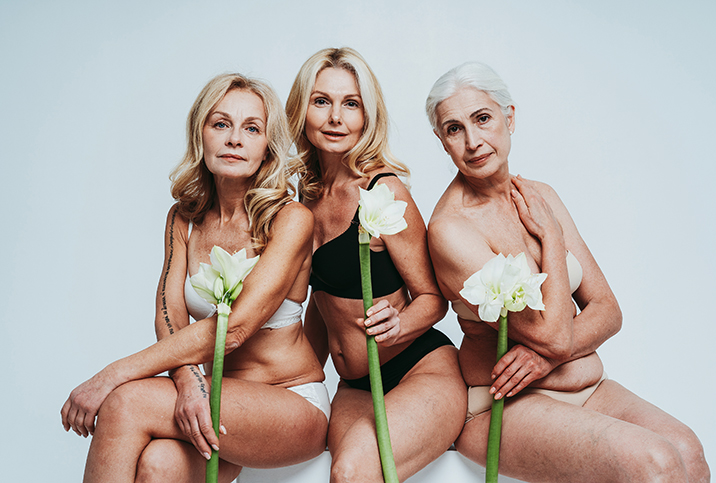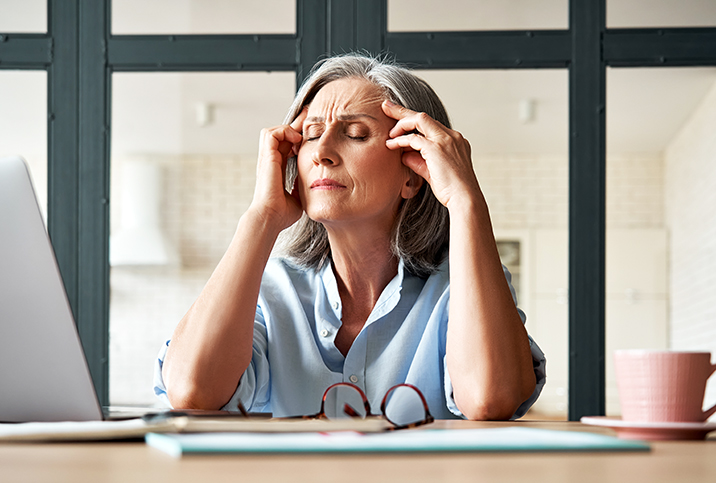Reframing Our Views on Menopause

Menopause is a natural part of a woman’s life cycle marked by one full year of no menstruation. While these major hormonal changes that accompany the menopausal years can be disruptive, it's important to remember nearly every woman has or will go through this—and you are not alone.
While menopause is commonly referred to as "the change," and it is indeed a big change, our bodies and hormones are fluctuating throughout our lifetime, day to day and even hour to hour.
Women, unlike most animals, live beyond their reproductive years. From the time we experience our first period, usually between the ages of 12 and 15, through perimenopause, generally in our late 40s, our bodies are biologically prepared for pregnancy and motherhood.
This 30-year reproductive stage does not define the totality of a woman’s life. If we reframe our mindset and view menopause as just one step in the natural process of life, we can feel better prepared for the changes menopause brings.
The grandmother hypothesis
George C. Willams originated the idea of the Grandmother Hypothesis in his 1957 paper on the evolution of aging. His theory sought to explain why a woman’s lifespan lasted well past her reproductive years.
Williams deduced that women evolved into living past menopause to support the growth of their grand offspring since humans need years of care before they are self-sufficient. As the older women began to educate and nurture grandchildren, they became vital to the well-being and overall structure of the family and community.
Contemporary researchers continue to study the Grandmother Hypothesis and the influencing roles of menopausal women in our societies today. Reframing menopause, we can think of ourselves as maturing into our female wisdom and taking our place as an integral part of the societal structure. Menopause can be seen as full of potential instead of a hardship to be endured.
Where to look for support
Theories aside, we cannot ignore the changes most women experience during menopause, such as hot flashes, weight gain, sleep disruptions and more. These menopausal markers can cause anxiety and insecurity about how to manage our well-being.
The best way to alleviate some of our worries is through education. Knowledge is power and by tapping into the many online resources available, we can create a greater sense of ease and confidence as we grow into our wiser selves.
So, where to start?
If you enjoy reading, look for materials that can help you understand the changes your body is going through. Dr. Martie Haselton is an interdisciplinary evolutionary scientist and professor at UCLA. Most of her research focuses on the role of hormones in our romantic and sexual relationships. Her book “Hormonal” is based on 20 years of research into the deep intelligence of our hormones and the role menopause has served ancestrally and today.
Research historian Susan Mattern examines women’s lives beyond fertility and their contributions in society throughout the ages in her book, “The Slow Moon Climbs.” She also examines how menopause became viewed as a medical condition rather than a life stage.
If you want the support of a community of women experiencing similar things to you, look into like-minded organizations. Our Bodies Ourselves is a collective of women committed to education and advocacy for women’s health and women’s rights. Today they have programs worldwide and publications in many languages. Their book “Our Bodies, Ourselves: Menopause” is a culmination of the latest research combined with personal storytelling from a diverse cross-section of women.
Another key organization is The North American Menopause Society (NAMS), a multidisciplinary nonprofit organization of doctors and scientists committed to providing accurate and unbiased information on menopause.
We start by changing our perspective
Menopause is part of our natural lifecycle, marked by significant hormonal, physical and physiological changes. However, our basic perception of this life stage can alter our experience of menopause. If we have questions, uncertainties and misconceptions, our best solution is educating ourselves, finding a community and working with healthcare professionals.


















